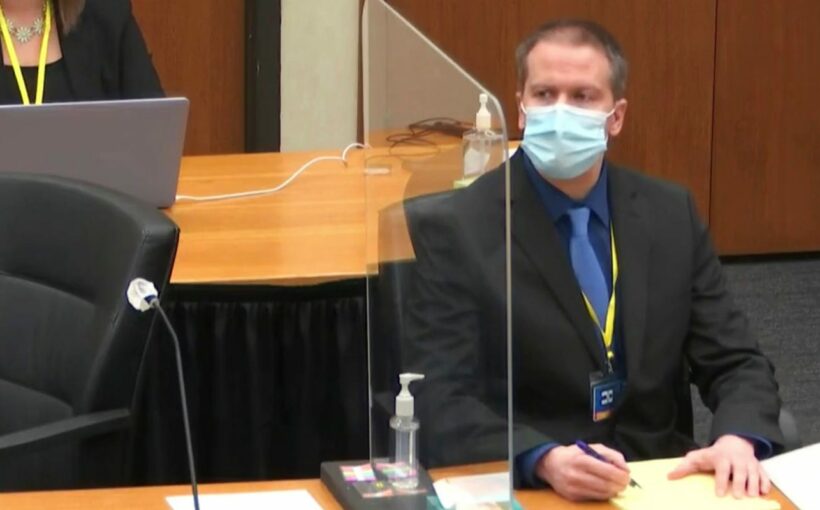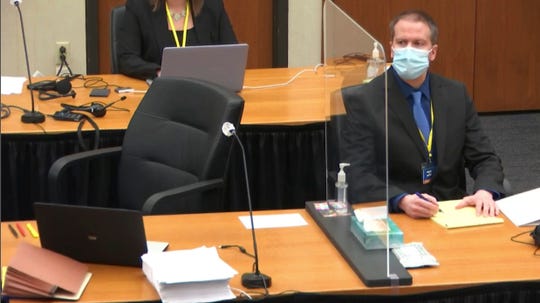MINNEAPOLIS — More witnesses were expected to take the stand Thursday in the murder trial of former Minneapolis police officer Derek Chauvin, where attorney questioning has returned to the topic of George Floyd’s drug use.
Floyd’s girlfriend Courteney Ross told jurors last week the two both became addicted to opioids four years ago after they were prescribed the drugs for chronic pain. Like millions of Americans, they tried to go clean but failed, she said.
On Wednesday, defense attorney Eric Nelson suggested Floyd said the words “I ate too many drugs” during his struggle with police last Memorial Day. He played several seconds of unintelligible police body-cam audio for witnesses: One said he couldn’t make out Floyd’s words, and other said he thought Floyd was saying “I ain’t do no drugs.”
In the afternoon, two forensic scientists said pills found in the SUV and police squad car Floyd had been in that day contained methamphetamine, a stimulant, and fentanyl, a synthetic opioid.
Chauvin is charged with second-degree murder, third-degree murder and second-degree manslaughter in Floyd’s death. The defense argues Floyd died as a result of the drugs in his system and underlying medical issues, but prosecutors say Floyd was killed by Chauvin’s knee on his neck for more than nine minutes.
Stay updated on the Derek Chauvin trial: Sign up for text messages of key updates, follow USA TODAY Network reporters on Twitter, or subscribe to the Daily Briefing newsletter.
Latest updates:
- Court is set to resume at 9:15 a.m. CT Thursday.
- Jurors have heard from 30 witnesses so far – all called by the prosecution.
- Jurors have sat through several days of highly technical testimony about use of force and chains of command, and a reporter in the courtroom Wednesday noted one juror may have fallen asleep.
- Expert witness Sgt. Jody Stiger, a Los Angeles Police Department officer who has conducted about 2,500 use-of-force reviews in his career, told jurors Wednesday that Chauvin used “deadly” force on George Floyd and kept his knee on Floyd’s neck for more than nine minutes.
‘Duty of care’: Prosecutors say Chauvin betrayed policy by not giving Floyd aid
The prosecution has said Chauvin is not only culpable in Floyd’s death but that he also failed to carry out his duty to provide basic care when Floyd was in medical distress and then became unresponsive.
Several Minneapolis police department officials testified Chauvin violated department policy by failing to move Floyd on his side to ease his breathing once he had been restrained face-down on the ground.
“When someone is in our custody, we have an obligation to provide for their care,” Minneapolis Police Chief Medaria Arradondo told jurors. That’s true even if an officer is applying defense tactics, the chief said. “They’re still in our custody,” he said. “They have rights.”
The defense has argued Chauvin and the other officers were unable to care for Floyd because they were distracted and threatened by a crowd of vocal, upset bystanders. “As the crowd grew in size, seemingly so too did their anger,” lead defense attorney, Eric Nelson, told jurors. Read more.
In this image taken from video, former Minneapolis police Officer Derek Chauvin watches as defense attorney Eric Nelson questions witness Los Angeles police department Sergeant Jody Stiger, Wednesday, April 7, 2021. (Photo: AP)
Expert witness Sgt. Jody Stiger says Chauvin used ‘deadly’ force
Sgt. Jody Stiger, a Los Angeles Police Department officer who has conducted about 2,500 use-of-force reviews in his career, told jurors Wednesday that Chauvin used “deadly” force on George Floyd and kept his knee on Floyd’s neck for more than nine minutes.
In this image from video, witness Jody Stiger, a Los Angeles Police Department sergeant testifies as Hennepin County Judge Peter Cahill presides Wednesday, April 7, 2021. (Photo: AP)
Stiger said the initial force used on Floyd was appropriate because Floyd was resisting arrest as officers tried to get him into their patrol car. However, after officers forced Floyd to the ground, “they should have de-escalated the situation,” Stiger said. Instead, the officers continued to intensify the situation, he said.
Stiger said the number of officers on the scene outweighed any threat posed by Floyd, who was not actively resisting while he was in the prone position. He said “no force should have been used after he was in that position.” But the pressure continually exerted by Chauvin “raised the possibility of death,” he said. More here.
Source: Read Full Article


